
You are here: GLORIA Home
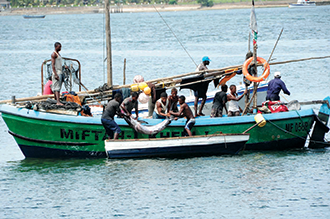
Fishing in Madagascar Credit: WWF MDCO
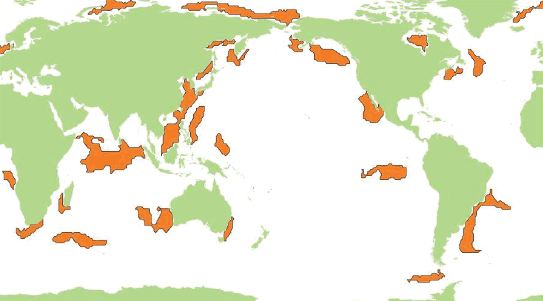
Marine hotspots:
Areas of rapid ocean warming - top 10% change in sea surface temperature.
After Hobday and Pecl, 2014.
Adapting to a changing ocean
The oceans are not warming evenly. In some fast warming areas the challenges will be felt earlier and more acutely. One such ‘hotspot’ covers the seas south and west of Madagascar.
There are no simple solutions for adapting to climate change. Finding appropriate options requires scientific understanding on a global scale, regional expertise, detailed information about the hotspot area, and local understanding of social and environmental contexts.
Madagascar Workshop Activities
To share existing knowledge and facilitate discussions of adaptation options, the workshop consists of eight key activities (right), each with its own objectives and designed for different stakeholders. A synthesis of these activities will be outlined at the workshop and completed in the following months.
Climate change projections
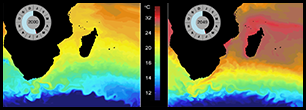 This activity will inform stakeholders about recent advances in climate change modelling for the region, present the most recent projections of key ocean characteristics, and inform other activities by providing climate-relevant information.
The activity is aimed mainly at higher-level policy makers and local scientists.
Projection movies
This activity will inform stakeholders about recent advances in climate change modelling for the region, present the most recent projections of key ocean characteristics, and inform other activities by providing climate-relevant information.
The activity is aimed mainly at higher-level policy makers and local scientists.
Projection movies
Ecological sensitivity assessment
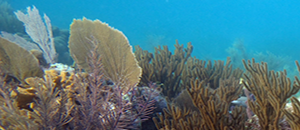 This aims to highlight species and fisheries that may be most vulnerable to climate change.
The activity is most relevant to managers, local scientists and community leaders.
This aims to highlight species and fisheries that may be most vulnerable to climate change.
The activity is most relevant to managers, local scientists and community leaders.
Identifying key ecological assets,
processes and drivers
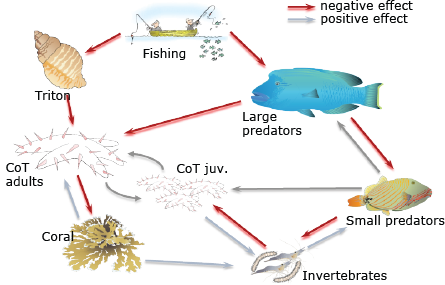 The aim of this activity is to provide an overview of current ecosystem modelling and collaboratively develop conceptual models of the system.
It will focus on simple, practical approaches. Participation by managers, ecologicsts, biologists and fisheries scientists is important for capturing interactions between components in the models
The aim of this activity is to provide an overview of current ecosystem modelling and collaboratively develop conceptual models of the system.
It will focus on simple, practical approaches. Participation by managers, ecologicsts, biologists and fisheries scientists is important for capturing interactions between components in the models
Interaction between climate change adaptation, local cultures and participation in fishing
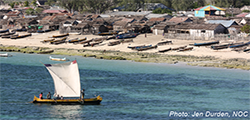 The aim is to determine perceptions of risks to livelihoods, to identify current and potential coping strategies, and to find alternatives to fishing where this is necessary and appropriate.
Participation by community leaders, managers, social scientists and fisheries managers is important for capturing key interactions.
The aim is to determine perceptions of risks to livelihoods, to identify current and potential coping strategies, and to find alternatives to fishing where this is necessary and appropriate.
Participation by community leaders, managers, social scientists and fisheries managers is important for capturing key interactions.
Marine resource supply chains
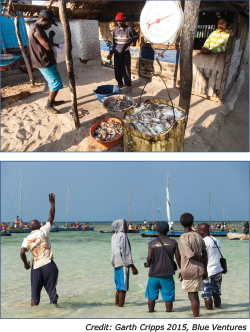 This activity will analyse important supply chains to identify vulnerabilities and strengths. Managers, community leaders,
representatives of fishing and processing industries, fisheries scientists and economists will collaboratively develop adaptation options.
This activity will analyse important supply chains to identify vulnerabilities and strengths. Managers, community leaders,
representatives of fishing and processing industries, fisheries scientists and economists will collaboratively develop adaptation options.
Engagement with local communities
This activity is centred on understanding the dynamics of poverty and the characteristics of poverty in coastal communities. Community leaders, managers, social scientists, and fisheries managers, will work together using GIS and other technical tools to analyse the dynamics and characteristics of poverty.
Capacity development
Participants will work with open source software to capture and map spatial information about communities and resources. As time is short, this is likely to be combined with the community engagement activity above.
Education and outreach
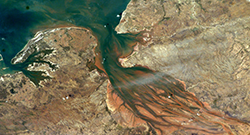 The activity will provide tools that can strengthen awareness and knowledge of the oceans through effective teaching. The resources are aimed at teachers and educators,
NGO’s, after school programmes, etc. and may easily be adapted to local conditions in order to promote engagement and concern with the state of the ocean.
The activity will provide tools that can strengthen awareness and knowledge of the oceans through effective teaching. The resources are aimed at teachers and educators,
NGO’s, after school programmes, etc. and may easily be adapted to local conditions in order to promote engagement and concern with the state of the ocean.
GLORIA Aims
GLORIA aims to consolidate scientific and traditional understanding of change to ecosystems and their services, through the development and sharing of techniques, knowledge and successful approaches between Madagascar and other marine hotspot regions.
Central to GLORIA research is a workshop held in Madagascar, 14-16 June 2016, where experts from the marine and climate sciences will work with Malagasy stakeholders to share information, explore adaptive solutions and develop recommendations for future action to minimize climate change impacts on marine-dependent, low-income communities.
Results from the workshop will inform climate change adaptation efforts in Madagascar and elsewhere in the Western Indian Ocean and other regions where similar marine-dependent communities are also affected by rapid warming of adjacent seas.
Final Workshop Report (PDF)
Workshop activities and presentations
Download workshop programme:
Download workshop brochure:


GLORIA is funded by the UK's Ecosystem Services for Poverty Alleviation programme and supported by Natural Environment Research Council National Capability funding.
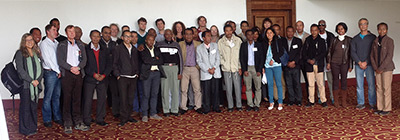
Workshop participants.
Larger photo
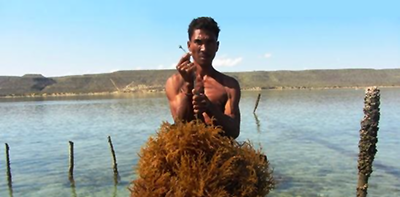
Credit: IH-SM
